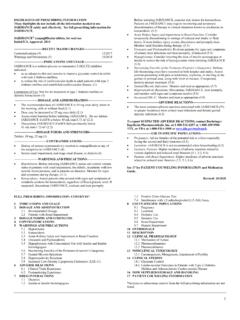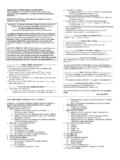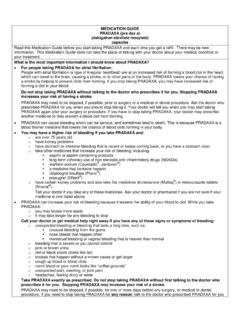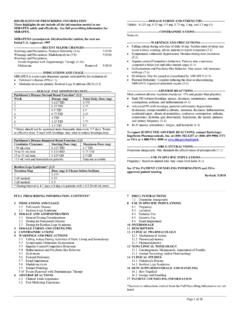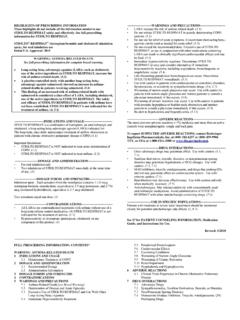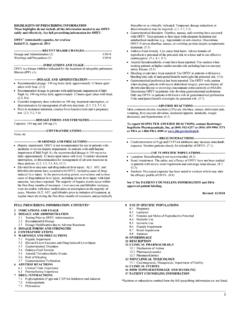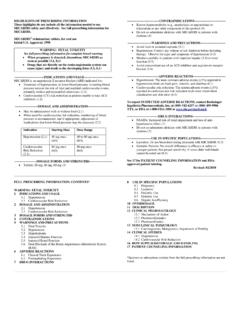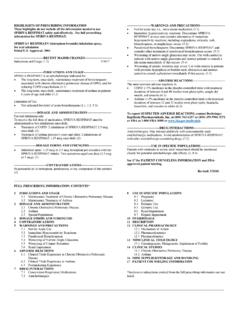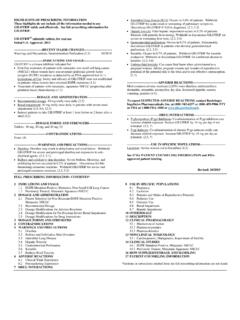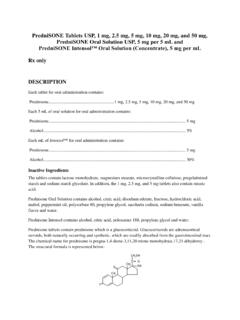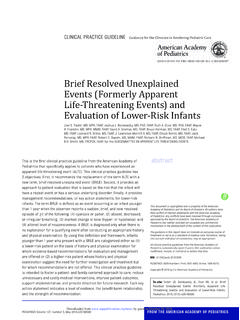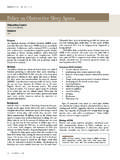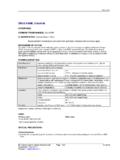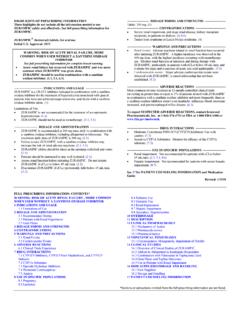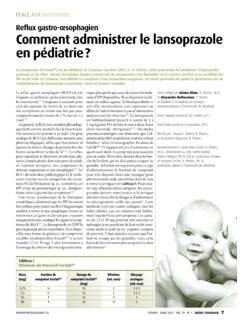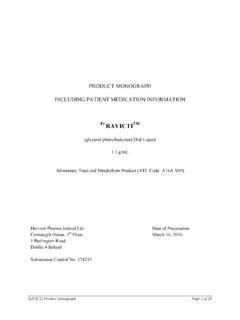Transcription of HIGHLIGHTS OF PRESCRIBING INFORMATION …
1 HIGHLIGHTS OF PRESCRIBING INFORMATION These HIGHLIGHTS do not include all the INFORMATION needed to use SPIRIVA HANDIHALER safely and effectively. See full PRESCRIBING INFORMATION for SPIRIVA HANDIHALER. SPIRIVA HANDIHALER (tiotropium bromide inhalation powder), for oral inhalation use Initial Approval: 2004 ----------------------------INDICATIONS AND USAGE--------------------------- SPIRIVA HANDIHALER is an anticholinergic indicated for the long-term, once-daily, maintenance treatment of bronchospasm associated with chronic obstructive pulmonary disease (COPD), and for reducing COPD exacerbations (1) ----------------------DOSAGE AND ADMINISTRATION----------------------- For oral inhalation only. DO NOT swallow SPIRIVA capsules. Only use SPIRIVA capsules with the HANDIHALER device (2) Two inhalations of the powder contents of a single SPIRIVA capsule (18 mcg) once daily (2) ---------------------DOSAGE FORMS AND STRENGTHS---------------------- Inhalation powder: SPIRIVA capsules contain 18 mcg tiotropium powder for use with HANDIHALER device (3) -------------------------------CONTRAIND ICATIONS------------------------------ Hypersensitivity to tiotropium, ipratropium, or any components of SPIRIVA capsules (4) -----------------------WARNINGS AND PRECAUTIONS------------------------ Not for acute use: Not a rescue medication ( ) Immediate hypersensitivity reactions: Discontinue SPIRIVA HANDIHALER at once and consider alternatives if immediate hypersensitivity reactions, including angioedema, urticaria, rash, bronchospasm, or anaphylaxis, occur.
2 Use with caution in patients with severe hypersensitivity to milk proteins. ( ) Paradoxical bronchospasm: Discontinue SPIRIVA HANDIHALER and consider other treatments if paradoxical bronchospasm occurs ( ) Worsening of narrow-angle glaucoma may occur. Use with caution in patients with narrow-angle glaucoma and instruct patients to consult a physician immediately if this occurs. ( ) Worsening of urinary retention may occur. Use with caution in patients with prostatic hyperplasia or bladder-neck obstruction and instruct patients to consult a physician immediately if this occurs. ( ) ------------------------------ADVERSE REACTIONS------------------------------- The most common adverse reactions (>5% incidence in the 1-year placebo-controlled trials) were upper respiratory tract infection, dry mouth, sinusitis, pharyngitis, non-specific chest pain, urinary tract infection, dyspepsia, and rhinitis ( ) To report SUSPECTED ADVERSE REACTIONS, contact Boehringer Ingelheim Pharmaceuticals, Inc.
3 At (800) 542-6257 or (800) 459-9906 TTY, or FDA at 1-800-FDA-1088 or ------------------------------DRUG INTERACTIONS---------------------------- --- Anticholinergics: May interact additively with concomitantly used anticholinergic medications. Avoid administration of SPIRIVA HANDIHALER with other anticholinergic-containing drugs. ( ) -----------------------USE IN SPECIFIC POPULATIONS------------------------ Patients with moderate to severe renal impairment should be monitored closely for potential anticholinergic side effects (2, ) See 17 for PATIENT COUNSELING INFORMATION and FDA-approved patient labeling. Revised: 2/2018 _____ FULL PRESCRIBING INFORMATION : CONTENTS* 1 INDICATIONS AND USAGE 2 DOSAGE AND ADMINISTRATION 3 DOSAGE FORMS AND STRENGTHS 4 CONTRAINDICATIONS 5 WARNINGS AND PRECAUTIONS Not for Acute Use Immediate Hypersensitivity Reactions Paradoxical Bronchospasm Worsening of Narrow-Angle Glaucoma Worsening of Urinary Retention Renal Impairment 6 ADVERSE REACTIONS Clinical Trials Experience Postmarketing Experience 7 DRUG INTERACTIONS Sympathomimetics, Methylxanthines, Steroids Anticholinergics 8 USE IN SPECIFIC POPULATIONS Pregnancy Lactation Pediatric Use Geriatric Use Renal Impairment Hepatic Impairment 10 OVERDOSAGE 11 DESCRIPTION 12 CLINICAL PHARMACOLOGY Mechanism of Action Pharmacodynamics Pharmacokinetics 13 NONCLINICAL TOXICOLOGY Carcinogenesis, Mutagenesis.
4 Impairment of Fertility 14 CLINICAL STUDIES 16 HOW SUPPLIED/STORAGE AND HANDLING 17 PATIENT COUNSELING INFORMATION *Sections or subsections omitted from the full PRESCRIBING INFORMATION are not FULL PRESCRIBING INFORMATION 1 INDICATIONS AND USAGE SPIRIVA HANDIHALER (tiotropium bromide inhalation powder) is indicated for the long-term, once-daily, maintenance treatment of bronchospasm associated with chronic obstructive pulmonary disease (COPD), including chronic bronchitis and emphysema. SPIRIVA HANDIHALER is indicated to reduce exacerbations in COPD patients. 2 DOSAGE AND ADMINISTRATION For oral inhalation only. Do not swallow SPIRIVA capsules, as the intended effects on the lungs will not be obtained. The contents of the SPIRIVA capsules should only be used with the HANDIHALER device [see Overdosage (10)]. The recommended dose of SPIRIVA HANDIHALER is two inhalations of the powder contents of one SPIRIVA capsule, once-daily, with the HANDIHALER device [see Patient Counseling INFORMATION (17)].
5 Do not take more than one dose in 24 hours. For administration of SPIRIVA HANDIHALER, a SPIRIVA capsule is placed into the center chamber of the HANDIHALER device. The SPIRIVA capsule is pierced by pressing and releasing the green piercing button on the side of the HANDIHALER device. The tiotropium formulation is dispersed into the air stream when the patient inhales through the mouthpiece [see Patient Counseling INFORMATION (17)]. No dosage adjustment is required for geriatric, hepatically-impaired, or renally-impaired patients. However, patients with moderate to severe renal impairment given SPIRIVA HANDIHALER should be monitored closely for anticholinergic effects [see Warnings and Precautions ( ), Use in Specific Populations ( , , ), and Clinical Pharmacology ( )]. 3 DOSAGE FORMS AND STRENGTHS Inhalation Powder: SPIRIVA HANDIHALER consists of SPIRIVA capsules containing tiotropium powder for oral inhalation and a HANDIHALER device.
6 SPIRIVA capsules contain 18 mcg of tiotropium in a light green, hard gelatin capsule with TI 01 printed on one side and Boehringer Ingelheim company logo on the other side. The HANDIHALER device is only intended for use with the SPIRIVA capsules. 4 CONTRAINDICATIONS SPIRIVA HANDIHALER is contraindicated in patients with a hypersensitivity to tiotropium, ipratropium, or any components of this product [see Warnings and Precautions ( )]. In clinical trials and postmarketing experience with SPIRIVA HANDIHALER, immediate hypersensitivity reactions, including angioedema (including swelling of the lips, tongue, or throat), itching, or rash have been reported [see Warnings and Precautions ( )]. 5 WARNINGS AND PRECAUTIONS Not for Acute Use SPIRIVA HANDIHALER is intended as a once-daily maintenance treatment for COPD and should not be used for relief of acute symptoms, , as rescue therapy for the treatment of acute episodes of bronchospasm.
7 Immediate Hypersensitivity Reactions Immediate hypersensitivity reactions, including urticaria, angioedema (including swelling of the lips, tongue, or throat), rash, bronchospasm, anaphylaxis, or itching, may occur after administration of SPIRIVA HANDIHALER. If such a reaction occurs, therapy with SPIRIVA HANDIHALER should be stopped at once and alternative treatments should be considered. Given the similar structural formula of atropine to tiotropium, patients with a history of hypersensitivity reactions to atropine or its derivatives should be closely monitored for similar hypersensitivity reactions to SPIRIVA HANDIHALER. In addition, SPIRIVA HANDIHALER should be used with caution in patients with severe hypersensitivity to milk proteins. Paradoxical Bronchospasm Inhaled medicines, including SPIRIVA HANDIHALER, may cause paradoxical bronchospasm. If this occurs, it should be treated immediately with an inhaled short-acting beta2-agonist such as albuterol.
8 Treatment with SPIRIVA HANDIHALER should be stopped and other treatments considered. Worsening of Narrow-Angle Glaucoma SPIRIVA HANDIHALER should be used with caution in patients with narrow-angle glaucoma. Prescribers and patients should be alert for signs and symptoms of acute narrow-angle glaucoma ( , eye pain or discomfort, blurred vision, visual halos or colored images in association with red eyes from conjunctival congestion and corneal edema). Instruct patients to consult a physician immediately should any of these signs or symptoms develop. Worsening of Urinary Retention SPIRIVA HANDIHALER should be used with caution in patients with urinary retention. Prescribers and patients should be alert for signs and symptoms of urinary retention ( , difficulty passing urine, painful urination), especially in patients with prostatic hyperplasia or bladder-neck obstruction. Instruct patients to consult a physician immediately should any of these signs or symptoms develop.
9 Renal Impairment As a predominantly renally excreted drug, patients with moderate to severe renal impairment (creatinine clearance of <60 mL/min) treated with SPIRIVA HANDIHALER should be monitored closely for anticholinergic side effects [see Clinical Pharmacology ( )]. 6 ADVERSE REACTIONS The following adverse reactions are described, or described in greater detail, in other sections: Immediate hypersensitivity reactions [see Warnings and Precautions ( )] Paradoxical bronchospasm [see Warnings and Precautions ( )] Worsening of narrow-angle glaucoma [see Warnings and Precautions ( )] Worsening of urinary retention [see Warnings and Precautions ( )] Clinical Trials Experience Because clinical trials are conducted under widely varying conditions, the incidence of adverse reactions observed in the clinical trials of a drug cannot be directly compared to the incidences in the clinical trials of another drug and may not reflect the incidences observed in practice.
10 6-Month to 1-Year Trials The data described below reflect exposure to SPIRIVA HANDIHALER in 2663 patients. SPIRIVA HANDIHALER was studied in two 1-year placebo-controlled trials, two 1-year active-controlled trials, and two 6-month placebo-controlled trials in patients with COPD. In these trials, 1308 patients were treated with SPIRIVA HANDIHALER at the recommended dose of 18 mcg once a day. The population had an age ranging from 39 to 87 years with 65% to 85% males, 95% Caucasian, and had COPD with a mean pre-bronchodilator forced expiratory volume in one second (FEV1) percent predicted of 39% to 43%. Patients with narrow-angle glaucoma, or symptomatic prostatic hypertrophy or bladder outlet obstruction were excluded from these trials. An additional 6-month trial conducted in a Veteran's Affairs setting is not included in this safety database because only serious adverse events were collected. The most commonly reported adverse drug reaction was dry mouth.
